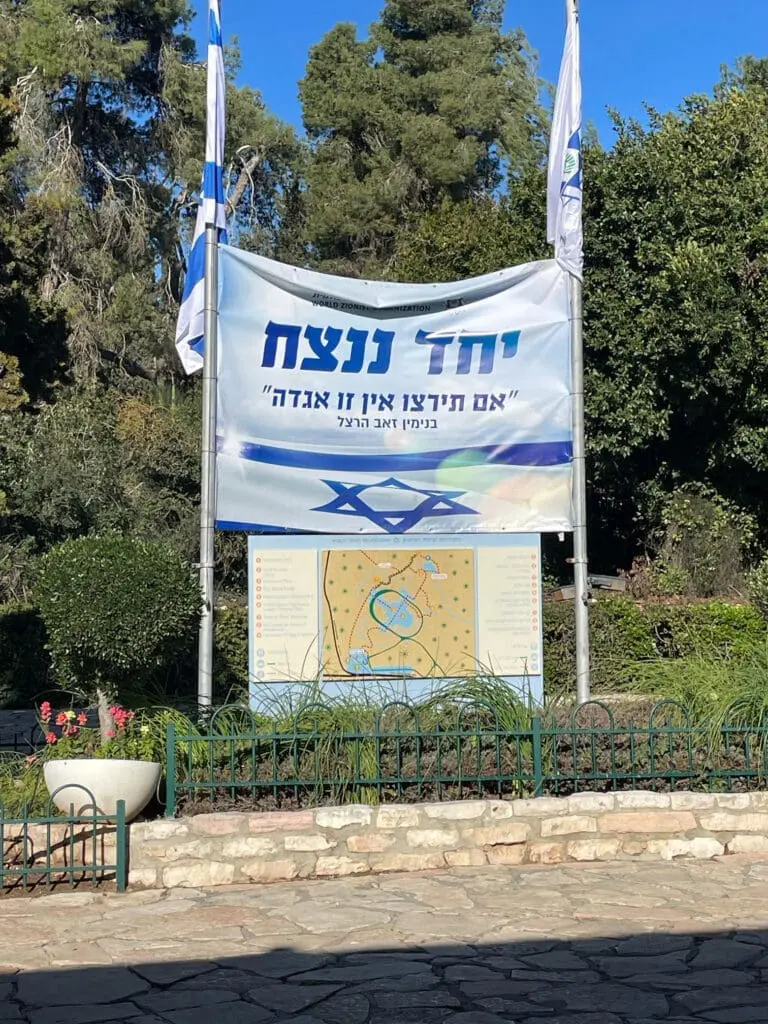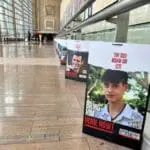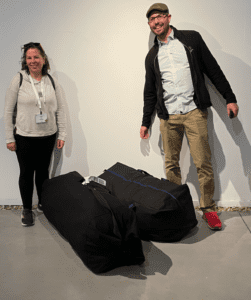
Rabbi’s Mission to Israel

I wrote to you from Gate C-9 at Ben Gurion airport, as I wait to board my El Al flight back to the states. This will be the first in a series of blog posts reflecting on my mission to Israel.
As you know, I flew on Monday afternoon and landed Tuesday morning. It’s late Thursday night and I’ll be back in Norwalk before minyan on Friday morning. That is to say, this was short. And so very impactful.
In this post, I want to give a real look at Israel. Not what you see on the news, which these days is much more about air strikes and the suffering of millions in Gaza—which of course is true. We’ve lost the view into Israel that, as expected, lasted less than a week after October 7.
So what’s it like? Honestly, it’s a strange mix of normal and… suspended on October 8. People are going to bars and eating at restaurants, and you can’t walk 10 feet on any street without encountering pictures of the hostages, Israeli flags, and bumper stickers and posters and banners declaring the strength of the Israeli people and the confidence that “together we will win”, יחד ננצח. It’s everywhere. And it’s also inside each and every Israeli.
Each incredible person we met on our journey expressed that confidence, as well as another crucial message that I want to broadcast loud and clear: they are deeply appreciative that we came to visit. That we brought open hearts and ears, that we wanted to understand what they went through and are going through now. They want us to come back. They want YOU to visit. And it’s safe to do so.
In future posts, I’ll describe the horrors that took place in the south—that’s one of the main reasons I went—but here I want to acknowledge something that became so very clear. Americans, including most American Jews, don’t really have a grasp on what Israelis went through. And conversely, Israelis don’t have the capacity to understand the very serious challenges we are facing in the States. We get our news from our media, and it stopped telling stories of destruction and heroism and survival months ago. Our news doesn’t tell us about the brave Sderot police officers who saved two young girls from a car where Hamas terrorists had murdered both of their parents, and who then defended their brand-new police station as long as they could, until the army came and shelled it to pieces because only terrorists remained inside. Our media doesn’t tell us about the retired army soldiers who form a kitat konenut, or rapid response team, on every kibbutz in the south. The group on kibbutz Sa’ad, where I lived on my gap year in Israel, fought off the terrorists who came with detailed maps of the kibbutz, and nobody was killed. The media doesn’t talk about the incredibly creative and capable civilians who stepped up and put together a civilian situation room, which collected and distributed clothing, toys, baby food and baby gear—whatever anyone needed—starting October 7. It doesn’t tell us about how hard it was for the Israeli forensic scientists to identify all of the bodies, or how much strength it takes for the army representatives to knock on the doors of each and every family to tell them their loved one has died, and then to sit with them until they’ve made all the phone calls and started to plan the funeral. And all the while, sirens go off in the north and in the south as Hamas and Hezbollah continue to fire rockets into Israel. This is what’s happening in Israel, and this is what people are carrying as they try to move forward. And I feel compelled to bring all of this to you.
There’s that old adage that Israelis argue amongst themselves during times of peace, and they unite very strongly when they are threatened from the outside. That has proven true since October 7. Israelis are united. The protest movement leaders made a conscious decision to put the protests aside and focus on civilian support of the war effort. And of course, army service and reserves are both at a high—regardless of religion, religious practice, or any other difference, everyone wants to defeat Hamas.
I want to bring you another message that I heard over and over again, that Israelis REALLY want a closer relationship between Israel and Jewish communities around the world. Like, for real. In this spirit of unity, they hope that their government, whoever it is, will make a serious effort to close the gaps that have opened up over the years. I hope that is true.
I return to the States with a renewed energy for sharing what’s really happening in Israel, and it cannot be overshadowed by what we see on TV and social media here. If you don’t already read www.timesofisrael.com, please start.
And stay tuned for more posts and pictures. (To view the Rabbi’s March 2 D’var Torah on her mission, click here.)
Rabbi Paskind

Rabbi Paskind and Rabbi Jeff Brown of Scarsdale deliver duffels of donated items from their congregations to Achim LaNeshek, the civilian situation room in Tel Aviv

